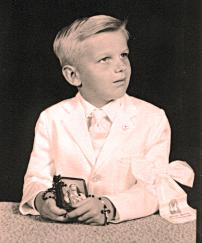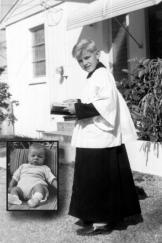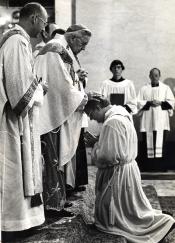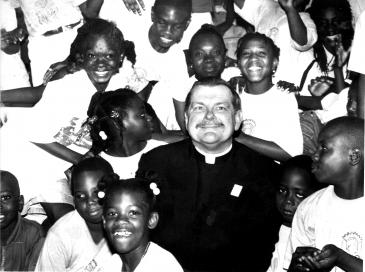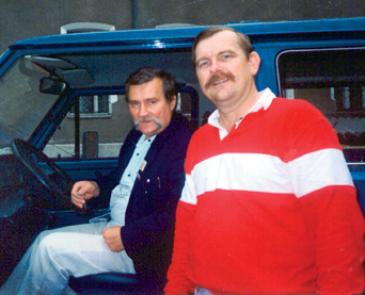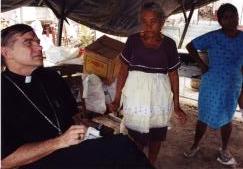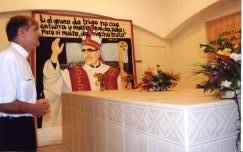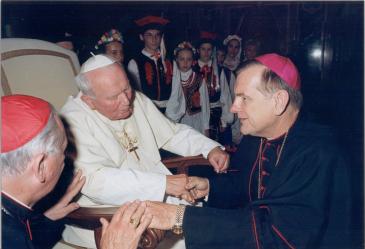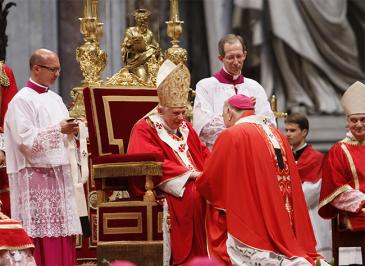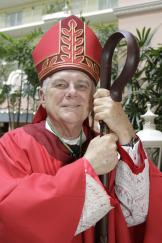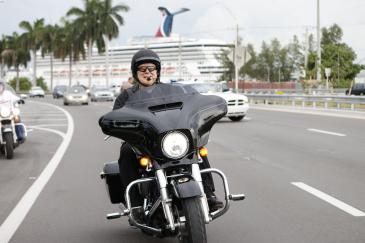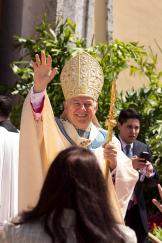By Archbishop Thomas Wenski - The Archdiocese of Miami
Photography: COURTESY | FILE
Archbishop Thomas Wenski preached this reflection during a vespers service May 15 marking the 40th anniversary of his ordination. The vespers took place at St. John Vianney Seminary in Miami, where he entered as a ninth-grader. Following the vespers, priests and archdiocesan department directors enjoyed dinner and dancing music. They also could purchase cigars hand-rolled on site. See photos, story here.
The months of May and June see many of our priests here in the Archdiocese of Miami celebrate the anniversaries of their ordinations to the priesthood. So I am not the only one celebrating an anniversary. Today, of course, I celebrate 40 years � joining me are Tom Wisniewski and Dan Kubala. Father Richard Soulliere, who was also ordained with us, asked to be excused tonight. At 93, he doesn’t like to go out at night. There were eight of us ordained by Archbishop Coleman Carroll at St. Mary’s Cathedral on Saturday, May 15, the day before Mother’s Day, 40 years ago. The other four, I hope, are celebrating with us, as Bishop Roman used to say, from “el segundo piso” (the second floor).
There is a hymn which is sung
occasionally in the liturgy of the hours. Its first verse is the following:
Lord Jesus, once you spoke to men
Upon the mountain, in the plain;
O help us listen now as then,
And wonder at your words again.
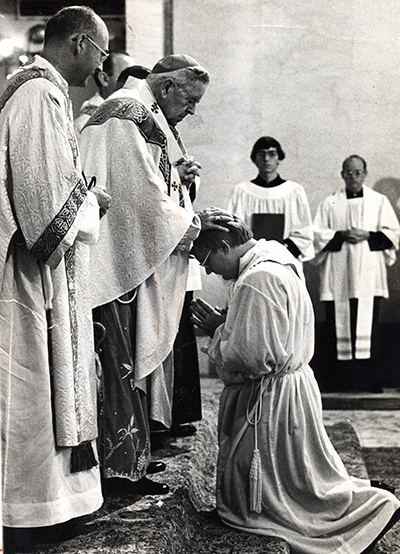
Photographer: FILE PHOTO
Archbishop-to-be Thomas Wenski is shown here being ordained in 1976 by Archbishop Coleman Carroll, Miami's founding bishop.
Perhaps celebrations such as this one are meant to “help us listen now as then” and “to wonder” at Jesus’ words yet again, so as to rediscover that first fervor which led us all to say “yes” to the gift and mystery of our priestly vocation.
The second verse of the hymn is as follows:
We all have secret fears to face,
Our minds and motives to amend;
We seek your truth, we need your grace.
Our living Lord and present Friend.
As Jesus’ heart was moved with pity for the troubled and the abandoned, those who seemed like sheep without a shepherd, so too a priest’s heart should be moved; pastoral charity � and not the desire for fame or fortune � should motivate each of us in our ministry.
When Jesus first sent out his apostles, he told them: “Proclaim the Kingdom of God�Cure the sick, raise the dead, cleanse lepers, drive out demons” (Matthew 10: 8). Quite a job description for the apostles � and for us priests.
For a priest is to “cure the sick”: that is, to attend to the ill and the injured, healing their isolation with a visit and bringing courage to those who are weak; a priest is to raise the dead: that is, to restore hope to those deadened by discouragement and defeat; a priest is to cleanse lepers: that is to befriend the outsider, to extend the hand of friendship to the marginalized and rejected; a priest is to drive out demons: by helping people deal with the various addictions that affect them and by not failing to address any personal demons that may threaten the integrity of his own commitment.
During this Year of Mercy, may we priests remember that the priestly anointing we received is not meant just to make us “fragrant”; rather, as Pope Francis reminds us, our anointing is meant “for the poor, the prisoners, the sick, for those sorrowing and alone.” The Pope insists that a priest is not to build walls but bridges. And he has challenged all of us to “go out of the sacristies and go to the ‘outskirts’ where people of faith are most exposed to the onslaught of those who want to tear down their faith.”
St. Paul says: “For if I preach the gospel that gives me no grounds for boasting. Necessity is laid upon me. Woe to me if I do not preach the gospel” (1 Cor. 9: 16).
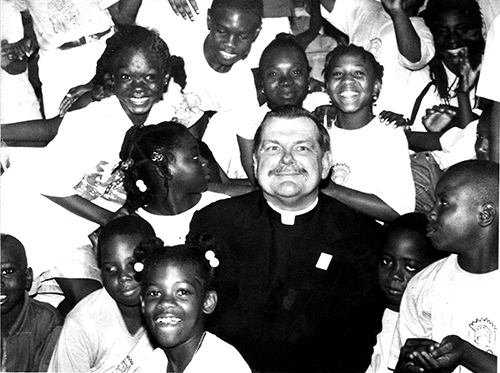
Archbishop - then Father - Thomas Wenski is surrounded by Haitian kids from Notre Dame d'Haiti Mission and the Pierre Toussaint Haitian Catholic Center in this file photo from the early 1990s.
We priests carry the great treasure of our priesthood in “vessels of clay” and it is readily apparent that we were called to this noble vocation in spite of our own unworthiness. This is as true for each one of us as it was for Peter and the Apostles. Simon Peter told Jesus, “Depart from me for I am a sinner.” Nevertheless, Jesus chose him as he has chosen us. Again to quote St. Paul, who as a one-time persecutor of the Church seemed to be an unlikely candidate to become the Apostle to the Gentiles: “� God chose the foolish things of the world to shame the wise; God chose the weak things of the world to shame the strong.” Yet, while God doesn’t call the most qualified, he does wish to qualify the called, and for this we need to make ourselves ever submissive to his will.
Except for the seven years that I served in Orlando as its bishop, I have spent my entire priesthood here in the Archdiocese of Miami. I served for three years as parochial vicar at Corpus Christ parish and then until my ordination as auxiliary bishop I worked as the parish priest of the Haitian community here in South Florida for 18 years. I learned Spanish in the seminary � I was almost the “poster child” for bilingualism in the seminary. They called me back then: “un Americano arrepentido hecho un cubanazo” (a repentant American turned super Cuban). But if a priest is supposed to be “servant leader” and the People of God our masters, then we “servants” should speak the language of our masters. And so when I was at Corpus Christi, it was only natural that I should try to learn to speak some Haitian Creole. Archbishop McCarthy found out � and so he assigned me to the Haitian Apostolate.
“Omnia omnibus,” All things to all men. When I was auxiliary bishop, Cardinal Keeler of Baltimore asked one of his permanent deacons who is a Haitian � and a noted surgeon � to call me to ask me something about a project in Haiti. We had never met before � but I had heard of him; and so, when he got me on phone, I naturally spoke to him in Creole. He presumed that I was a Haitian and later asked the cardinal why he hadn’t told him I was Haitian. The cardinal said that I wasn’t and so the next day he called me and said, “You’re not Haitian, the cardinal told me.” And so I replied, “Ki moun w ap kw� mwen menm oubyen blan sa a? Who are you going believe? Me or that white guy?”
These past 40 years have been years of incredible grace and blessing for me. The protagonist of Bernanos’ famous novel, “The Diary of a Country Priest,” says: “It is all grace.” Thus, we priests can count on the extraordinary graces of the Lord Jesus who remains ever close to us.
We also count on the prayers and collaboration of brother priests, deacons and religious men and women; and, especially, we count on the prayers of the faithful whom we were ordained to serve. As I reflect back on these 40 years, I become ever more keenly conscious of the fact of how those prayers, and the collaboration of so many grace-filled people, have made it possible for the Lord to work through me, helping me � often times in spite of myself � to teach, lead and sanctify that portion of the Lord’s flock entrusted to my care.
Again back to that hymn: “O help us listen now as then and wonder at your words again�We seek your trust, we need your grace, our living Lord and present Friend.”
Oremus pro invicem. Let us pray for one another.

